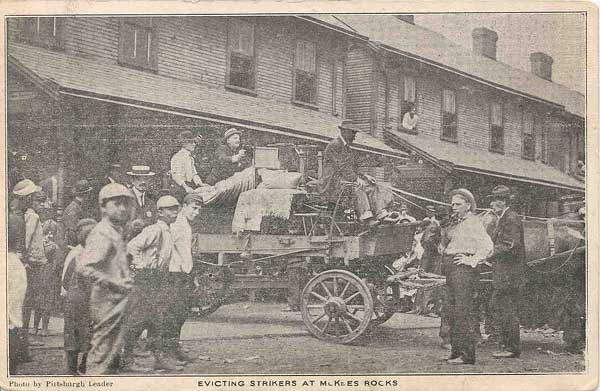
This Day in Labor History: September 3, 1991. A chicken factory in Hamlet, North Carolina caught of fire thanks to nonexistent safety procedures, killing 25 workers and injuring another 55. Let's talk about this horrible and extremely preventable disaster! 

This entirely avoidable accident was reminiscent of workplace disasters of the past, with open employer contempt for safety regulations and the lives of their workers.
The building where the chicken factory was located was built in the early twentieth century and had been used in various food processing operations in the past, including as an ice cream factory. In 1980, it was purchased by Imperial Foods.
This was a company was a terrible safety reputation in its other plants. Its plant in Moosic, Pennsylvania was cited for managers locking exit doors. Its Cumming, Georgia plant had a fire in 1989 that caused over $1 million in damage, although no fatalities.
Emmett Roe, the guy who ran the company, was a comic book villain who was just an awful human being.
The corporate hostility to basic safety procedures would be repeated in Hamlet. The factory had no fire alarm system. The factory was used to process chicken for fast food restaurants and pre-frozen products for grocery stores.
That meant cutting, bagging, weighing, and, most importantly for this story, frying it. About three-quarters of the workers were African-Americans.
Hamlet is a small town close to the South Carolina border and the worker histories reflected that. Many of these workers had grown up doing farm work in the area and for some, this was their first factory job.
Imperial’s CEO Emmett Roe had moved from Pennsylvania to the South in order to bust the unions in his plants there and move to a state with a “more favorable regulatory climate,” i.e., the kind of state that won’t inspect your factories or enforce safety violations.
Among other states, he chose North Carolina. A state in bed with the agricultural industry if there ever was one, North Carolina regulators never inspected the factory because the budget for inspections was minuscule. In 11 years of operation, it received no fire inspections.
The factory did undergo repeated inspections from the company’s poultry inspector. Workers complained about the terrible smell and quality of meat, with at least one telling an inspector that the meat processed into chicken nuggets was particularly awful.
According to one survivor of the fire, the plant managers locked the door to stop workers from stealing chicken. This was the same excuse sweatshop managers gave to locking the doors at Triangle when that disaster killed 146 workers in 1911.
The fire began when the deep fryer caught fire after a hydraulic line to a cooking vat failed, with obvious problems with it not found because of the company’s indifferent safety culture.
It spread very quickly thanks to a combination of burning cooking oil, insulation, and exploding gas lines hanging from the ceiling. It didn’t help that all of the phones inside the building were nonfunctional. The workers at the front of the plant all managed to get out.
But at the back of the plant the company did not place any fire alarms. Moreover, Imperial managers not only locked all the exits but sealed the windows as well. Those workers had nowhere to go. As an old plant, it was a maze of paths inside.
The smoke meant they couldn’t find their way to the front. They were doomed. Like at Triangle, which this fire reminded many of, a few workers did get out the back by breaking open a locked loading bay, but most died.
On one door, near charred bodies, blackened footprints could still be seen, signs of the desperate attempt to escape. Eighteen of the dead were women. Most of the dead were African-American.
There was both a state and a federal investigation of the fire. The state passed the buck. The state labor commissioner said that his department did not have enough money (true, thanks to the notoriously anti-labor North Carolina legislature.
Three men faced charges for the fire. Imperial Foods owner Emmett Roe, his son, and the plant manager. They all took plea bargains.
Since Roe had personally directed the locking of the doors, he received a prison sentence of nearly 20 years, less than a year for each of the murders he committed. He served four years in prison.
Imperial Foods also received an $800,000 fine. The factory was never reopened. 215 people lost their jobs. The federal government ordered North Carolina to improve its worker safety legislation or the government would do it for them.
This did lead to the passage of 14 new laws, including a whistleblower law, as well as a near doubling of state workplace safety inspectors.
Memorializing the deaths also faulted along state lines. For the survivors, this was not only a labor rights issue, but a civil rights issue.
They invited Jesse Jackson to the town to speak at the memorial. For Hamlet’s conservative white elite, Jackson was anathema. So there were two memorial services with two monuments next to each other.
The factory remains were bulldozed in 2001 because of the psychological damage it caused the survivors and the firefighters who saw it. Eight survivors lived within viewing distance of it.
Here is a 1994 film about the disaster
Finally, you really need to read @BryantSimon book Hamlet, which is a great read about this whole issue, labor in the food industry, Roe's horribleness, NC's terrible regulatory culture, etc.
thenewpress.com/books/hamlet-f…
thenewpress.com/books/hamlet-f…
Back tomorrow to discuss the election of Salvador Allende in Chile in 1970.
• • •
Missing some Tweet in this thread? You can try to
force a refresh








